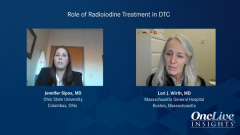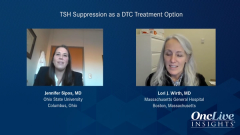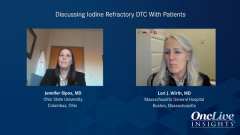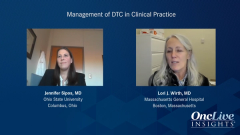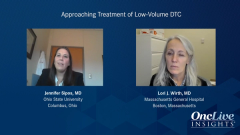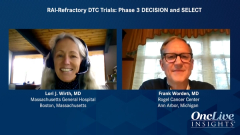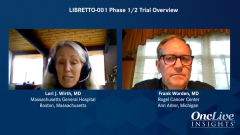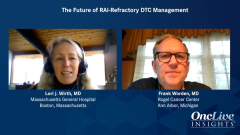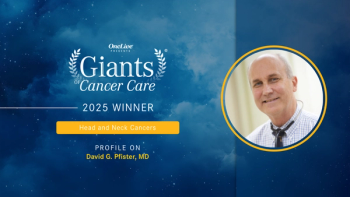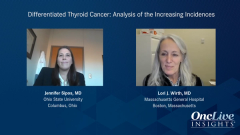
RAI-Refractory DTC Trials: Phase 3 DECISION and SELECT
Episodes in this series

Lori J. Wirth, MD: Thank you for joining us today on this program on radioactive iodine-refractory differentiated thyroid cancer [RAI-refractory DTC]. I’m Lori Wirth from Massachusetts General Hospital in Boston, and with me is Dr Frank Worden, a professor of medicine at the Rogel Cancer Center at the University of Michigan. Hi, Frank.
Frank Worden, MD: Hi, Lori.
Lori J. Wirth, MD: Nice to see you.
Frank Worden, MD: Good to see you.
Lori J. Wirth, MD: Today, we’re going to be talking about advancements in treating patients with RAI-refractory DTC, as well as unmet needs in this setting. To start the discussion, I have to say that it’s been an incredible time in this field. In the last 10 years, we’ve made incredible progress. We’ve gone from having no drugs that are appropriate for treating patients with RAI-refractory DTC, to now all of a sudden, 6 FDA-approved drugs in our arsenal to treat patients—sorafenib, lenvatinib, the 2 multikinase inhibitors that are approved. Then we have larotrectinib and entrectinib approved for treating patients with NTRK fusion-driven cancers. Additionally, we have 2 recent approvals of selpercatinib and pralsetinib, the RET-specific therapies that are pertinent for RET fusion-positive thyroid cancer. It’s been a remarkable time, and I don’t think that that’s going to be stopping or slowing in the near future.
Frank, let’s start talking about the most common patients in our practices, patients with RAI-refractory DTC, who don’t necessarily have a gene-specific or a genotype-driven disease. Drugs sorafenib and lenvatinib are approved in this setting. Of course, the DECISION trial was the first trial completed. Please start by telling us about the DECISION and SELECT trials, and where you see the similarities and differences.
Frank Worden, MD: Sure, thank you. The DECISION trial was a great breakthrough for thyroid cancer because it was the first study, it was presented at ASCO [the American Society of Clinical Oncology annual meeting] in a plenary session and later published, that shows that progression-free survival is improved with sorafenib compared to placebo. Overall, we don’t have survival data, but we have progression-free survival data, which show 10.8 months for those patients who received sorafenib. The median survival for the placebo group was about 5.8 months, and the overall response rate was 12%.
The complicating factors or adverse features that came out of this study were hand-foot syndrome, hypertension, and fatigue. This study also had a quality-of-life analysis that showed that patients didn’t feel bad until they started medication. But once they started and they dropped to a certain level, they were able to maintain their quality of lives throughout the remainder of the study. We have very good data in about 100% of patients there. We know that these drugs are tolerable. We can adjust the doses based on adverse effects, and people can stay on the medication.
Then came the SELECT study, which was presented at ASCO the following year at the head and neck cancers session and later published in The New England Journal of Medicine. This was also a landmark study and probably the biggest to come out of the treatment of thyroid cancer in the last several years, as you had mentioned, Lori. Similarly, it was a crossover study with a design looking at a placebo vs the multikinase inhibitor lenvatinib. Patients started at 24 mg, and then were treated until progression, and patients in the placebo group again had the opportunity to cross over.
Here we see progression-free survival that was around 18.3 months compared to 3.6 months in the placebo group. This was phenomenal, and the best part about this study compared to the DECISION study was that we saw about a 65% response rate. There were 2 or 3 patients who had complete responses, and that is something that’s meaningful for these patients. A lot of them have bulky disease. They can’t breathe, they’re symptomatic, so when you can attain a response as high as that, that’s excellent.
We also encountered several adverse effects, just like in DECISION. Hypertension, fatigue, and proteinuria were some of the reported issues. Those were also adjusted. With this drug, perhaps compared to sorafenib, we don’t have the quality-of-life data, but it is similar. We know we can get good responses with bigger doses, and once we stop and adjust, patients can go back on. This led to, as you mentioned earlier, the FDA approval for this drug, and sorafenib prior to that. This started our breakthrough for the treatment of RAI-refractory thyroid cancer.
Transcript edited for clarity.



